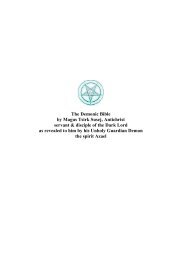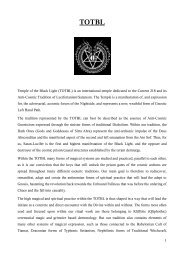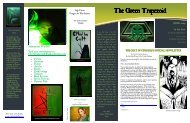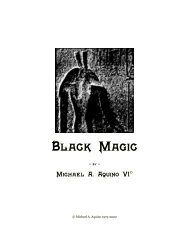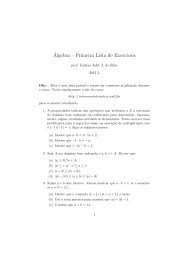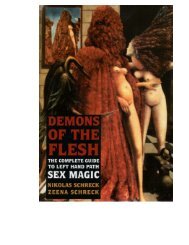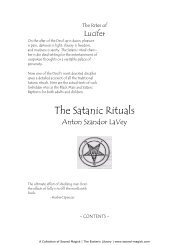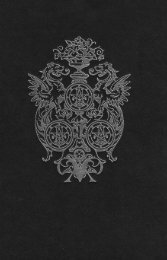Satanism Today - An Encyclopedia of Religion, Folklore and Popular ...
Satanism Today - An Encyclopedia of Religion, Folklore and Popular ...
Satanism Today - An Encyclopedia of Religion, Folklore and Popular ...
Create successful ePaper yourself
Turn your PDF publications into a flip-book with our unique Google optimized e-Paper software.
Possession <strong>and</strong> Exorcism 211<br />
the oracle <strong>of</strong> Delphi), by taking drugs (e.g., peyote<br />
among certain Native American groups) or wine<br />
(Dionysus cults), by rituals involving body techniques<br />
(such as hyperventilation, monotonous<br />
drumming, dancing, chanting), or by fasting.<br />
Once this altered state <strong>of</strong> consciousness is created,<br />
the host is no longer in a regular state <strong>of</strong> wakefulness<br />
<strong>and</strong> might, at times, not even remember the<br />
experience <strong>of</strong> possession (the somnambulistic<br />
type <strong>of</strong> possession).<br />
Where possession is viewed as an evil phenomenon,<br />
as in traditional Christianity, the practice <strong>of</strong><br />
exorcism has been developed to expel the spirit<br />
from the host. “Exorcism” derives from exousia,<br />
Greek for “oath.” To exorcise thus means something<br />
along the lines <strong>of</strong> placing the possessing spirit<br />
under oath—invoking a higher authority to compel<br />
the spirit—rather than an actual “casting out.” This<br />
placing under oath implies a kind <strong>of</strong> binding. In<br />
Western religions in particular, exorcism is <strong>of</strong>ten<br />
dramatic <strong>and</strong> even violent. Outside <strong>of</strong> the Christian<br />
tradition, the possessing spirit is viewed as a neutral<br />
entity that can be transformed into a benign one<br />
through specific rituals <strong>and</strong> religious practices.<br />
In the mid-nineteenth century, a movement<br />
known as Spiritualism was based on the consultation<br />
<strong>of</strong> spirits <strong>of</strong> the dead through séances <strong>and</strong><br />
mediums. Spiritualism, being founded on what<br />
seemed to be a scientific methodology (the<br />
séances), became the true religion to such reflective<br />
individuals as Arthur Conan Doyle (creator <strong>of</strong><br />
Sherlock Holmes). Similarly, Spiritism, which was<br />
developed in France by Allan Kardec, emphasized<br />
the invocation <strong>of</strong> spirit guides who could help<br />
with the healing <strong>of</strong> diseases that originated out <strong>of</strong><br />
a spiritual need.<br />
In more recent times, especially in the<br />
occult/metaphysical/new age subculture,<br />
mediums have been redesignated as channels,<br />
who focus on delivering metaphysical information<br />
rather than messages from the dead. There<br />
are a number <strong>of</strong> religious movements that are<br />
based on the authority <strong>of</strong> channeled messages.<br />
Most conservative Christians would view all such<br />
mediumship <strong>and</strong> channeling as a form <strong>of</strong><br />
demonic possession. Typically, fundamentalist<br />
Christians who are not charismatic also view<br />
Pentecostal phenomena as demonic.<br />
The societies in the areas around ancient Israel<br />
were ardent believers in possession <strong>and</strong> regularly<br />
practiced exorcism. Such phenomena appear to<br />
have been far less prevalent in Judaism, although it<br />
has been speculated that later writers may have<br />
edited out references to such practices. Exorcism<br />
is, nevertheless, mentioned in Hebrew scriptures<br />
(the Old Testament). Early rabbinical literature<br />
also makes reference to exorcism.<br />
As portrayed in the New Testament, demons<br />
constitute the infernal equivalent <strong>of</strong> God’s celestial<br />
host. Although the story is not spelled out in the<br />
Bible, a number <strong>of</strong> passages seem to allude to the<br />
well-known story about Satan leading a celestial<br />
revolt. By implication, demons were formerly<br />
angels who were cast out <strong>of</strong> heaven with Lucifer<br />
after the failure <strong>of</strong> his revolution. Defeated in the<br />
celestial realm, the infernal host continues a kind<br />
<strong>of</strong> guerrilla warfare against God’s people in the<br />
earthly realm.<br />
While angels go about helping human beings<br />
<strong>and</strong> doing good, demons harass humanity <strong>and</strong> go<br />
about doing evil. Many parts <strong>of</strong> the New<br />
Testament recount stories <strong>of</strong> demons taking over<br />
human beings. In Jesus’s day mental <strong>and</strong> physical<br />
illness were <strong>of</strong>ten viewed as resulting from possession.<br />
Because such a significant part <strong>of</strong> Jesus’s<br />
ministry involved healing, he is frequently<br />
portrayed banishing demons from those he<br />
healed. Belief in the reality <strong>of</strong> demonic possession<br />
<strong>and</strong> exorcism is still very widely accepted by many<br />
conservative Christians, both Roman Catholic <strong>and</strong><br />
Protestant. The Bible contains so many accounts<br />
<strong>of</strong> exorcisms that anyone who wishes to interpret<br />
Christian scripture literally is compelled to accept<br />
the reality <strong>of</strong> demonic possession <strong>and</strong> exorcism.<br />
<strong>An</strong>d while the larger society ab<strong>and</strong>oned such<br />
notions long ago, they continue to have currency<br />
in our culture because <strong>of</strong> Hollywood’s ongoing<br />
production <strong>of</strong> films—both feature <strong>and</strong> B-grade—<br />
featuring possession <strong>and</strong> exorcism.<br />
Because <strong>of</strong> the tendency <strong>of</strong> certain conservative<br />
Christians to accept the biblical accounts<br />
literally, as well as because <strong>of</strong> Hollywood’s fascination<br />
with these notions, the New Testament<br />
view <strong>of</strong> these matters still decisively influences the<br />
way our culture portrays demonic possession <strong>and</strong><br />
exorcism. Perhaps the most familiar biblical




